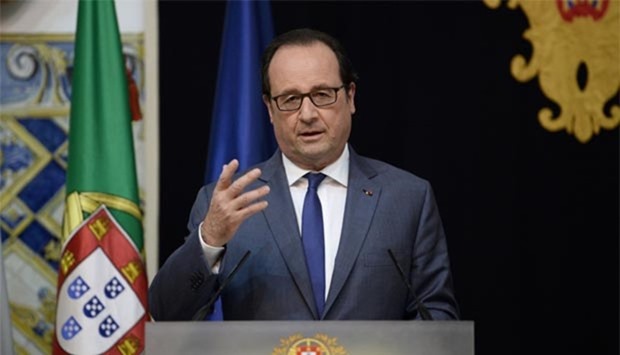President Francois Hollande said on Tuesday he was willing to extend France's state of emergency for another six months following the Bastille Day massacre, as lawmakers prepared to debate the country's tough security laws.
French MPs will mull a fourth extension of the eight-month-old state of emergency, as criticism mounted of the Socialist government's response to a slew of extremist attacks.
Hollande had announced last Thursday a planned lifting of the measures imposed after the November Paris attacks that killed 130.
But he changed tack just hours later, after a truck driver ploughed through a crowd leaving a July 14 fireworks display in Nice, leaving 84 dead.
Hollande initially proposed a three-month extension but said on Tuesday during a visit to Lisbon he was "open to a further extension of three months", making a total of six months.
His remarks were seen as a concession to the opposition Republicans, who have demanded that the state of emergency -- which gives the police extra powers to carry out searches and place people under house arrest -- be maintained through the end of the year.
With elections just around the corner, the political unity seen after last year's attack on satirical magazine Charlie Hebdo has evaporated.
And the Socialists have said they will draw the line at some of the opposition's more controversial demands.
Republicans leader and former president Nicolas Sarkozy, who is eyeing another run for the top job in 2017 elections, has called for anyone showing signs of being radicalised to be forced to wear an electronic tag, placed under house arrest or kept in a detention centre.
"We can't lock people up on the basis of mere suspicion, or suspicion of suspicion," minister for parliamentary relations Jean-Marie Le Guen retorted Tuesday.
'Very violent images'
The Paris prosecutor's office said on Tuesday all 84 victims had finally been identified. Around 30 of the victims were Muslims, said an official from a regional representative body.
Five days after the attack, 70 people are still hospitalised, 19 in critical condition.
On Monday, investigators said that 31-year-old Mohamed Lahouaiej Bouhlel, who used a 19-tonne truck to mow the victims down, had shown "recent interest" in jihadist activity.
Authorities found "very violent" photos on his computer, of corpses, fighters posing with the IS flag, and photos of Al-Qaeda founder Osama bin Laden.
However Paris prosecutor Francois Molins said there was no direct evidence of the Tunisian's links to IS -- which has claimed him as one of their "fighters."
Mass hotel cancellations
Tourism on the Cote d'Azur, where Nice -- France's second most-visited city after Paris -- is situated, has been battered by the attack.
In Extenso tourism consultancy said hotel cancellation rates were running at 20-40%.
The aftershocks are being felt in the capital also, where the director of the luxury Plaza Athenee hotel told AFP the phone had been "ringing off the hook with cancellations for July, August and September".
Unlike the perpetrators of the Paris attacks, Bouhlel, a petty criminal with a history of violence and depression, did not travel to the Middle East for training or jihad.
Molins, the prosecutor, said IS's call for supporters to strike targets in France had emboldened some people to act "without needing to go to Syria and without precise orders".
Psychotic tendencies
Bouhlel had a history of violence, with a doctor he consulted in Tunisia as a youth describing him as having psychotic tendencies.
In March, he received a suspended sentence for "armed assault" after beating a driver with a nail-studded plank in an episode of road rage.
He showed no interest in religion until recently, Molins said, with acquaintances telling people he "ate pork, drank alcohol, took drugs and had an unbridled sexual activity".
However earlier this month, he stopped shaving his beard, telling friends it was for "religious" purposes.
Six people are still being held over the attacks, including a 38-year-old Albanian suspected of providing Bouhlel with a pistol he used to fire at the police who shot him dead.
In a sign of the mounting frustration over a string of extremists bombings, shootings and stabbings that have killed over 230 people in 18 months, Prime Minister Manuel Valls was booed and heckled on Monday at a remembrance ceremony in Nice.
Interior Minister Bernard Cazeneuve has pointed to several steps taken by the government to boost security, including sending thousands of troops into the streets.
"There is no zero risk," Cazeneuve said. "By saying this we are telling the truth to the French and tackling the threat with lucidity."

French President Francois Hollande, on a visit to Portugal, addresses a press conference in Lisbon on Tuesday.
